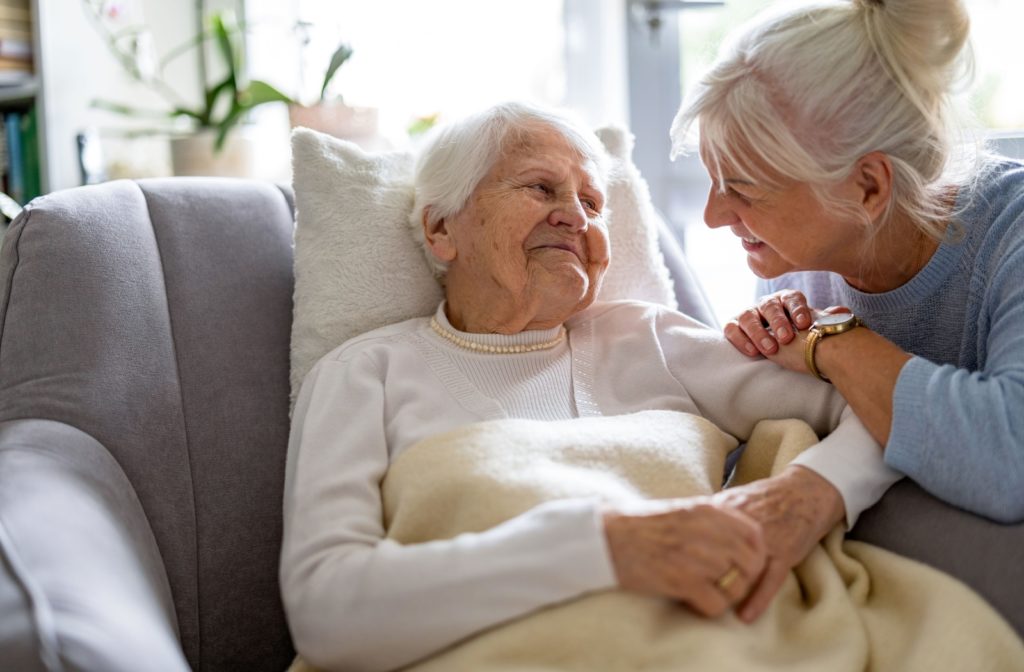The goal of every family is to provide their loved ones with the necessary care, support, and attention they need. As we change, these needs evolve as well. And, they can become more complicated in people with cognitive decline.
Everyone experiences cognitive decline differently, which is why there’s no exact time for memory care.
Although some people in the condition’s early stages can continue safely living in their current spaces, as the condition progresses, memory care is strongly encouraged.
There are certain signs to look for that suggest your loved one is ready for memory care:
- Declining cognitive and physical health
- Safety concerns
- Social withdrawal
- Caregiver burnout
Memory care effectively addresses these concerns by offering residents a welcoming, supportive, and safe environment.
All About Memory Care
Memory care is a long-term environment for people experiencing varying stages of cognitive decline.
Residents in memory care require more supervision and routine, which can be challenging to navigate at home or in assisted living. It’s common for residents to experience confusion, memory loss, difficulty managing daily tasks, or behaviors like wandering.
The specialized layout, services, and amenities in memory care help address residents’ growing care needs:
- Staff are available 24/7 to address safety concerns, help with daily tasks, and manage medication.
- A personalized daily care plan to reduce anxiety and encourage familiarity.
- Therapeutic programs and specialized activities stimulate cognitive function and promote social connections.
- Floor plans are equipped with wide layouts, wall supports, and enclosed outdoor spaces to prevent accidents like injuries or wandering.
Memory care directly supports the well-being of families and residents by alleviating the emotional and physical responsibilities of everyday caregiving. This allows families to focus their energy on creating meaningful memories and strengthening social bonds as they remain assured their loved ones are in trusted hands.
When is the Right Time for Memory Care?
Recognizing cognitive decline’s progressive nature helps families navigate the role of caregiving.
In the condition’s early stages, symptoms are minor and manageable, and people may continue thriving well in assisted living or at home. As the condition advances, symptoms worsen, signifying a need for professional support.
People who once managed on their own may struggle to perform basic tasks. And families may feel overwhelmed as the care demands increase.
Although there isn’t a definite “right” time for memory care, making this move is strongly encouraged once a loved one can no longer safely continue living in their current space.

Signs It’s Time for Memory Care
Although everyone’s readiness for memory care varies, there are certain signs to look for in your loved one that indicate they will benefit greatly from professional support.
Declining Physical & Cognitive Health
Although cognitive decline specifically targets areas of the brain like memory, judgment, and behavior, this condition also leads to declining physical health. These changes signify a diminished capacity for your loved one to manage their own care safely.
Signs of declining cognitive health can include:
- Memory lapses
- Trouble concentrating
- Shifts in behavior and mood
- Increased confusion and restlessness
These declining physical changes are a result of growing cognitive decline. Some signs to look for can include:
- Chronic fatigue
- Reduced mobility
- Loss of balance
- Muscle stiffness
- Change in appearance or body weight
- Neglecting personal hygiene
Declining overall health can make once simple daily activities more challenging. Memory care addresses these concerns by offering support with daily tasks, such as personal grooming, managing medication, and preparing nutritionally balanced meals, so residents can continue to look and feel great.
Safety Concerns
Safety concerns are often one of the clearest signs that your loved one may be ready for memory care. These can manifest in many ways, such as:
- Wandering
- Forgetting to lock doors
- Improper medication use
- Neglecting personal hygiene
- Unexplained injuries or bruises
- Leaving appliances like the oven, stove, or iron on
Although these are unintentional, these behaviors can risk the safety of your loved one and others, whether from accidents, getting lost, or even health complications.
We mitigate these risks with wide floor plans, handrails, wall supports, monitoring systems to prevent wandering, and round-the-clock staff to monitor the safety and well-being of residents.
Social Withdrawal
Changes in communication, memory, and understanding naturally lead to frustration and self-isolation. These behavioral changes can take an emotional toll, leading to feelings of loneliness and sadness, further contributing to their withdrawal.
Social withdrawal can manifest in several ways. Your loved one may:
- Stop responding to phone calls
- Avoid visits
- Remain silent during conversations
- Lose interest in hobbies
- Seem disengaged during family gatherings
Social connections are vital for everyone’s well-being, which is why memory care fosters a social and supportive environment between residents and staff members.
Group activities, social opportunities, and a sense of belonging help residents rebuild confidence in their social skills. The communal setting combats loneliness while providing your loved one with a network of peers facing similar challenges, promoting connection and emotional well-being.
Caregiver Burnout
Undeniably, caregiving is a demanding role, and it can take a toll on your physical and emotional health. If you’re feeling exhausted, frustrated, or overwhelmed, it’s a sign that you may need help. Besides, burnout directly influences the quality and level of care you can provide.
Not to mention, the needs of your loved one may exceed the capacity of home care. Memory care verifies your loved one receives the necessary attention and support they need while giving you the space to recuperate and remain a strong support system.
Find Support in Community
Deciding when to transition a loved one into memory care is rooted in their safety, health, and well-being. Relying on professional memory care support doesn’t mean you’re stepping away, it means you’re stepping up to give your loved one the specialized care they need.If you’ve noticed any of these signs mentioned in your loved one, take proactive steps to explore your options. Connect with our Merryvale Assisted Living team to schedule a tour of our memory care community.




